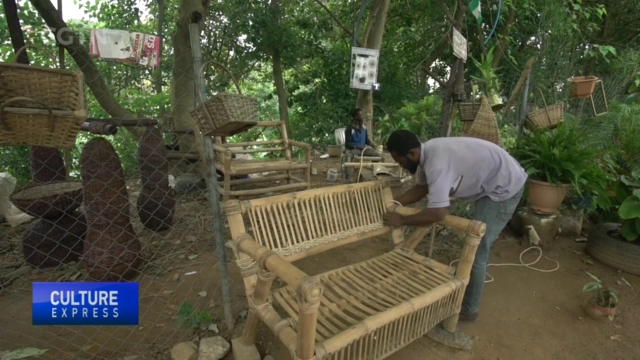
19:03, 07-Aug-2019
Nigeria Cane Arts: Cane weaving faces competition from imported upholstery
Updated
19:50, 07-Aug-2019

Cane weaving is a sub-sector of the building and construction industry in Nigeria. However, given the high demand for imported upholstery, the art is fast becoming extinct. CGTN's Deji Badmus met two men in Abuja, the country's capital, who are holding on to the tradition regardless of overwhelming competition.
Talk about artistry with precision and tact at play.
These hands have undergone many years of training to be able to weave these different patterns and designs which ordinarily appear very complex.
Cane weaving is a popular Nigerian art, which can be traced way back to pre-colonial times and Donald's story attests to this fact.
The art is deeply rooted in his genealogy. He has a background in farming and fishing with his grandfather, and what he now does with the cane is something he inherited from his father.
DONALD CANE ARTIST "My own father's origin started from the cane. He transports it outside Nigeria, so we use it to make a living to support the family. So, at long last, he said we should migrate to the cane. We now started using it for bed, chairs, basket, for December hampers, Salah."
The durability of their products stand them out. And that stems from the fact that every of the material they use is locally sourced.
ABEDNEGO STANLEY ARTIST "We don't import a single material. Everything we use, we get from here. We source them from our forest here and use and transform them into the beautiful pieces you see all around here."
DONALD CANE ARTIST "My customers are many, like when you build a house, like an estate, we plant the flowers, put your pool chairs, we can put rubber, canes to design those facilities."
Bars, restaurants and hotels are their biggest customers. This restaurant is designed with furniture purchased from Donald and his colleague. The restaurant manager says apart from creating the African ambience in her local food store, the furniture is also sending a signal for why made in Nigeria products should be patronized.
"Everybody is used to the usual plastic chairs and tables at other local restaurants, and we only felt it's right to give something different, something African, something cultural. If you go abroad, you can never find a place like this. You don't ever go to a place abroad and see tables or the furniture made out of African sources."
Donald and Abednego are looking to growing their business out of this roadside park. But they say that might be difficult to happen because they don't enjoy good patronage saying most Nigerians still choose imported furniture over locally made ones.
DONALD CANE ARTIST "If you go to the village, even the royal chiefs, most of them don't use this. They prefer upholstery. I would want the government to put more attention to what we're doing, to create a platform, a place where we, not only me, and also my colleagues doing this job can we can settle, where we can do this job and make more income to the economy."
With little or no formal education, these men have gone ahead to provide sources of income for themselves. Their intention is to train as many people as possible, and also pass the trade down to their children as well. Deji Badmus,CGTN, Abuja, Nigeria.
SITEMAP
Copyright © 2018 CGTN. Beijing ICP prepared NO.16065310-3
Copyright © 2018 CGTN. Beijing ICP prepared NO.16065310-3